disturbed
Showing 61–72 of 101 results
-
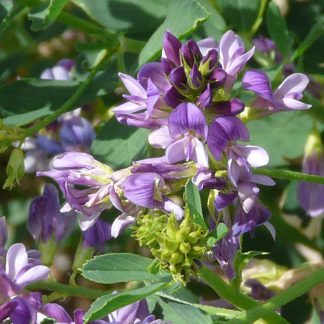
Medicago sativa / alfalfa
- escaped forage plant
- bright purple flowers in dense clusters
- pea-like flowers with broad upper petal, 2 small laterals, keel
- compound leaves with 3 leaflets, the central one extended on a short stalk
- disturbed sites - roadsides, full sun
-

Melilotus spp / sweetclover
- yellow or white, floppy, tubular flowers in long-ish clusters (racemes)
- 3 small, pointy leaflets with petioles
- rangy, unkempt branching
- roadsides, waste places and sometimes in fields, grasslands
-

Mentha canadensis / American cornmint
- crushed leaves smell like peppermint
- clusters of teeny white-blue-pink flowers in the axils of stem leaves
- square stems, lance-shaped leaves
- shaded, moist areas
- may form large clones
-
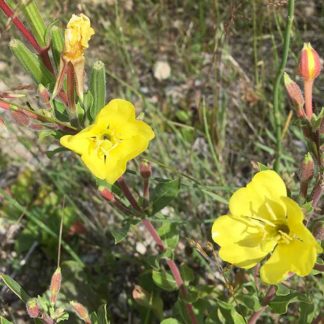
Oenothera villosa / hairy evening primrose
- yellow flowers on tall stalks, several flowers in a cluster
- 4 petals; 8 stamens; large, 4 part stigma
- hairy - often reddish - stems; hairy leaves
- lance-shaped leaves, larger on stem than basal
- disturbed areas and stream banks
-
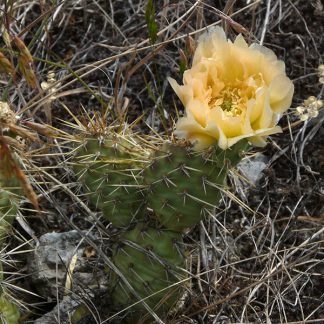
Opuntia polyacantha / starvation cactus
- yellow or peach, complex, many-petaled flowers
- large globose, pointed buds with reddish scales
- cactus pads with long or short spines and nasty glochids
-
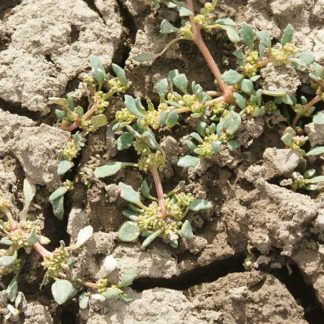
Oxybasis glauca / oak-leaved goosefoot
- typically prostrate and small, apart from other plants
- mudflats and other drying wet areas
- small, blue-green, small-lobed leaves; often w/ reddish stems
- teeny clusters of teeny yellow flowers
- leaves feel cool and damp due to glandular hairs on lower surface
-

Oxytropis sericea / white-point vetch
- white "pea" flowers in clusters of up to 25
- banner petal white with purple/blue veins
- hairy, pinnately compound leaves, all basal
- disturbed areas, especially exposed to cold, drought, high light etc.
- pretty, but toxic to grazing animals
-

Penstemon palmeri / Palmer’s penstemon
- very tall, exposed
- pink flowers with rose/grape scent
- flowers clumped on one side of stem in groups of 4-5
- red "guidelines" (bloody fangs) on lower petals
- stem leaves opposite, clasping, like little boats
-
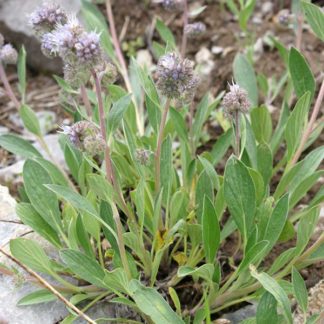
Phacelia hastata / silverleaf scorpionweed
- flowers - dull white-ish/purple-ish, numerous in short, compact, coiled clusters
- stamens extend well past petals
- leaves - basal with prominent veins; usually covered with silvery hairs; usually entire
- multiple flowering stems on a single plant
- in a variety of habitats
-

Phalaris arundinacea / reed canarygrass
- large, coarse, erect grass
- long, flat blades with pointy tips... from base
- distinct ligule—membranous and long
- large but compact inflorescences (panicles)
- often in dense monocultures, e.g. on river banks
-

Pinus albicaulis / whitebark pine
- high altitude - subalpine to alpine; cold, windy sites
- five needles in tight fasicles
- brown to purple cones at top of tree; cones don't open
- scaly grayish bark
-
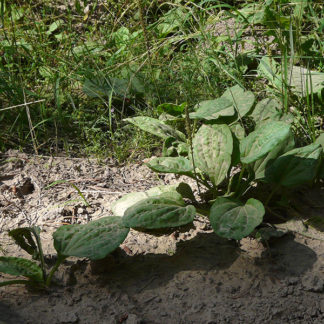
Plantago major / broadleaf plantain
Showing 61–72 of 101 results